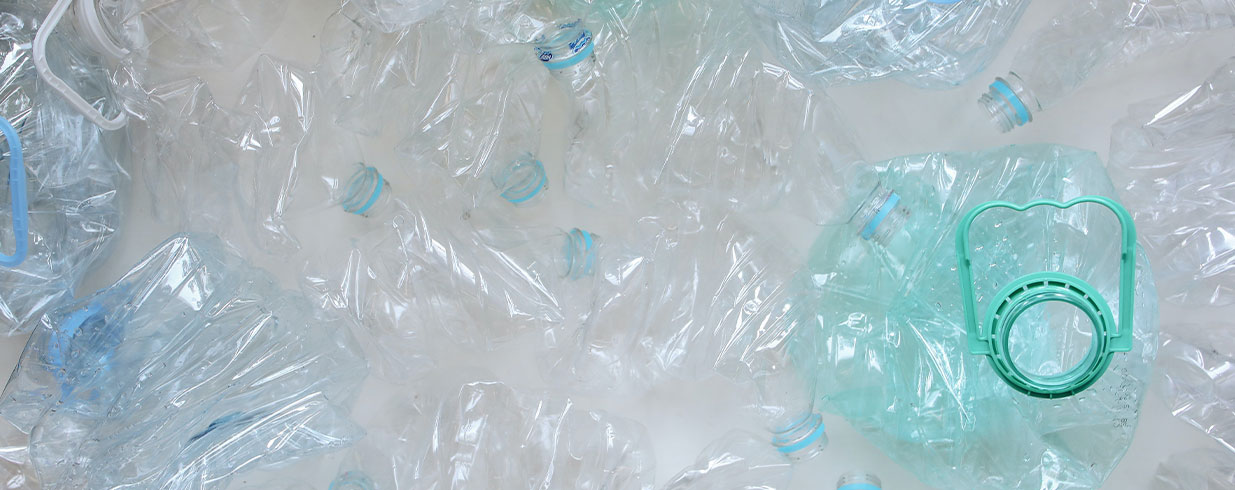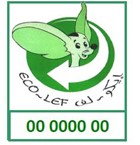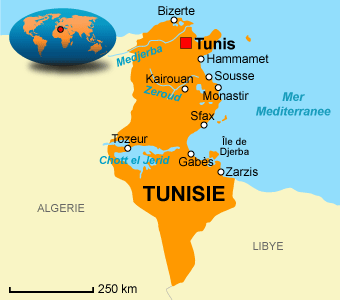Eco-Lef is a public recovery and recycling system for packaging waste, delivered in partnership with the private sector and local authorities.

Eco-Lef: a national system for the recovery and recycling of post-consumer packaging that focuses on plastic waste
OBJECTIVES
• Reduce landfilling of packaging waste.
• Limit the negative impact resulting from the presence of packaging waste in nature.
• Promote the recycling and recovery of packaging waste.
THE PACKAGING TARGETED
Plastic and metal packaging (with a capacity greater than or equal to 100 ml):
• Bottles of soft drinks and water (PET)
• Detergent bottles and containers (PVC)
• Plastic films and bags (made of PP)
• Metal cans (aluminium and steel)
BACKGROUND INFORMATION AND LOCATION
General information on waste management:
Economic growth in Tunisia over the last few decades has led to strong urbanisation, impacting ecosystems and natural resources. To tackle this problem, Tunisia has progressively put in place an environmental protection policy, which has rapidly evolved into a policy of promoting sustainable development.
The quantity of household and similar waste produced annually is estimated at 2.8 million tonnes, with about 55,000 tons of packaging. Household waste is characterized by a high rate of organic matter (63%) and by a high rate of humidity varying between 65% and 70%.
General information on the territory:
• Location: the whole country is covered by this system
• Country: Tunisia
• Population: 11,972,623 inhabitants
IMPLEMENTING BODIES
This programme was implemented thanks to the collaboration of the following organisations:
• ANGed (National Waste Management Agency) oversees the Eco-Lef platform. It directly manages, monitors and evaluates the development and management of waste management as well as awareness and public/private partnerships with the communes (collection campaigns).
• The Ministry of Local Affairs and Environment, for the approval of programs.
• The Ministry of Finance, for financing the system.
• The Bank of Small and Medium Enterprises: for granting of subsidised credits for collection and recovery companies.
KEY STAKEHOLDERS INVOLVED
• Municipalities (for the collection campaigns)
• Public/Private sector with collection and recycling companies, and
• NGOs and associations for awareness and information campaigns
GENERAL CONTEXT
In Tunisia, waste is a major problem for all stakeholders as well as for the general population.
Traditional waste management systems (where most waste is still landfilled) has caused a strong impact on the environment and resources. With several landfills reaching their end-of-life, and the construction of new landfills becoming very difficult due to the lack of potential sites and their rejection by the local inhabitants, the Tunisian Government has promoted sustainable waste management systems by structuring the waste sector around two major axes: reduction at source and waste recovery and recycling.
The annual quantity of packaging waste comprises 55,000 tonnes of plastics (11%), 44,000 tonnes of paper/cardboard (10%) and 100,000 tonnes of food packaging (or food cartons). Postconsumer packaging waste represents a significant problem in Tunisia. Discarded items such as plastic bottles (PET), yoghurt cups, flexible plastics, cans, and cartons could be commonly seen littering the roads and public spaces. Packaging waste is commonly sorted by informal waste pickers, directly from households, or in landfills.
Considering these quantities of recoverable waste, the issues of littering, and the potential for economic and social value, it was relevant to establish a national system such as “Eco-Lef” to implement a consistent national strategy. The establishment of Eco-Lef by the Tunisian government was an innovative initiative seeking to boost the recycling sector in Tunisia, which allowed developing the economy and creating jobs.
DESCRIPTION OF THE ACTIVITIES
The Eco-Lef System is governed by a decree that specifies the modalities for the collection and management of bags and packaging waste (Decree 97-1102 of June 1997, as amended by Decree 2001-843 of April 2001, on conditions and procedures for the collection and management of used packaging bags and packaging material). ANGed manages and finances this system through a specific eco-tax, paid by importers and local producers of plastic packaging.
Eco-lef is a public system of recovery and recycling of packaging waste, implemented in partnership with local authorities. Practically, it aims to promote the creation of small companies to collect packaging waste and to sell the sorted materials to ANGed.
Under the Eco-lef system, small companies authorised by ANGed collect packaging waste materials from informal collectors know as ‘barbechas’ and pay them immediately after weighing recyclable materials. These collection companies can sell this material to Eco-Lef collection points, but they have no obligation to do so.
The quantities collected by the authorised companies are brought to ‘Eco-LEF points’, a network of dedicated storage facilities, and are prepared for sale to recycling companies. These “Eco-Lef points” are responsible for storing the collected quantities, compact them and prepare them for recycling companies. In most of the cases, these Eco-lef points are installed in coordination with municipalities.
ANGed ensures an equal distribution of the collected quantities among the authorised recyclers. The recycled material is then sold to manufacturers (and possibly exported).
Prices and selling conditions are set in a contract established between the companies and ANGed. The selling price depends on the oil price.
FINANCING AND COST RECOVERY CONTEXT
Allocated budget: about 14 million dinars (2018).
Eco-Lef is financed by two main sources:
• An ecotax on the plastic material imported to Tunisia.
• Contracts signed between ANGed and the producers of packaged goods.
At the local level, waste management is also financed by a municipal tax, ecotaxes paid by hotels, and the central government.
MAIN ACHIEVEMENTS AND RESULTS
The Eco-Lef system is the first packaging waste management system established by an African country. It certainly contributed to kick-starting selective collection and recycling activities in Tunisia.
Key results:
• Creation of small companies to collect waste
• Creation of more than 15,000 jobs between collectors and recyclers in 2018
• Development of 318 Eco-Lef points and the collection of plastic packaging waste which reached 15,700 tonnes in 2008. However, the collected quantities have constantly decreased since then, and dropped down to 3,400 tonnes in 2018
• Number of Eco Lef points connected to the ANGed agency in 2018: 45
• Number of active private Eco Lef points in 2018: 180 (230 in 2010)
• Number of recycling units (Private sector) in 2018: 148
KEY FACTORS OF SUCCESS
The success of the Eco-Lef initiative depends on several factors such as:
• Development of a regulatory framework
• Mobilisation of stakeholders around a national project
• Coordination with municipalities, the private sector and civil society,
• Raising awareness of the society at large for sorting at source.
BOTTLENECKS, LIMITATIONS AND CHALLENGES
The Eco-Lef system greatly contributed to the development of packaging waste collection and recycling schemes in Tunisia. However, the system faces challenges in terms of governance, while the general performance has been decreasing since 2009. It seems that the system faces competition from private companies that can offer better prices.
The following points can be seen as the main limitations of the Eco-Lef system:
• Packaging and beverage producers are not involved in the organisational aspects of the system: direct impact on the management of Eco-LEF and its financial mechanisms;
• Lack of obligation on consumers to sort their waste. Consumers are not actively involved in the system;
• Lack of (reliable) data: at the national level, the total quantity of the collected packaging material is not well estimated. The available data covers only packaging waste that is collected officially under Eco-Lef, and does not include waste quantities collected by formal and informal operators.
• Financial sustainability and lack of resources: The system of payment for collected waste is not flexible enough to meet the needs of collectors and recyclers.
• Eco-Lef only collects waste materials that have a positive value, and many types and quantities of packaging waste are still not covered.
In addition, there are other challenges related to recycling in Tunisia. There is a lack of incentives for innovation or to expand the recycling industry in Tunisia.
LESSONS LEARNED AND REPLICABILITY
The experience of Eco-Lef helps in the identification of several lessons as to how a packaging waste collection system should be established. In general, the system should be re-organised as an EPR system with a participatory approach, bringing together the different stakeholders: producers, collectors, recyclers, etc.
A clear legal framework is needed to ensure a proper and better structuring of the system as an EPR model, especially on the roles and responsibilities of the different stakeholders. Control mechanisms should be implemented to ensure that producers comply with the regulation (especially if they decide not to join the Eco-lef system). Such a legal framework should also set targets and a consistent monitoring system. Transparency is an essential element in this regard.
Finally, the roles of local authorities and collectors should be clearly defined. Municipalities must be trained to make sure that the system is properly implemented at local level. Informal waste pickers should be better integrated into the system. More work must be devoted to communication, awareness raising and education, to ensure that consumers also properly contribute to the effort in an informed manner.
REFERENCES, LINKS TO FURTHER INFORMATION
• GIZ (2020), ECO-LEF in Tunisia: A case study, EPR TOOL BOX, https://prevent-waste.net/wp-content/uploads/2020/11/Tunisia.pdf
• Chaabane W. et al. (2019), Shifting Towards Sustainable Tourism: Organizational and Financial Scenarios for Solid Waste Management in Tourism Destinations in Tunisia,
• Chaabane W. (2020), Gestion des déchets plastiques en Tunisie: Vers une responsabilité partagée, https://tn.boell.org/fr/2020/03/05/gestion-des-dechets-plastiques-en-tunisie-vers-une-responsabilite-partagee
• http://www.anged.nat.tn/user_files/seminaires/32/Filière%20ECO-LEF%20-%2022-02-2018.pdf
Key information
Topic: prevention, separate collection, recycling
Waste fraction: Plastic and metal packaging waste (with a capacity greater than or equal to 100 ml)
Target group: private sector, citizens
Instruments: regulation, economic instrument, infrastructure
Date of the implementation
Since April 2001

